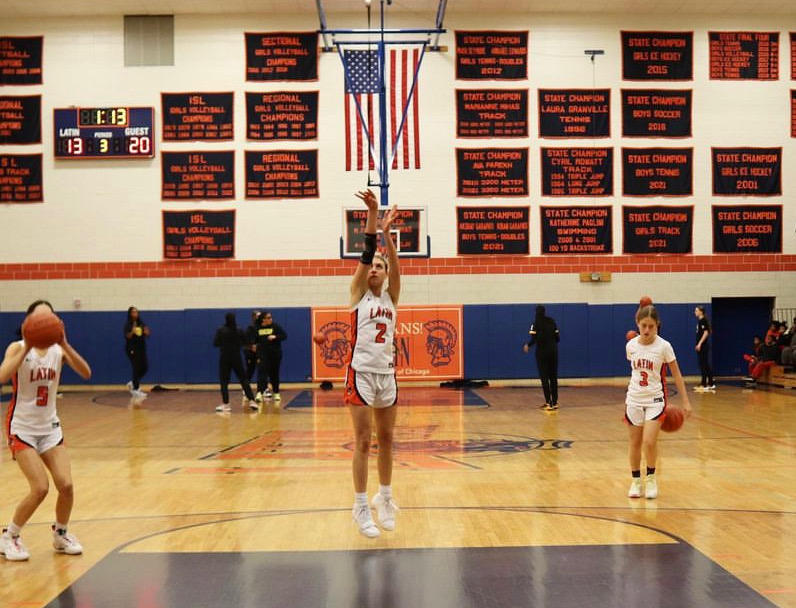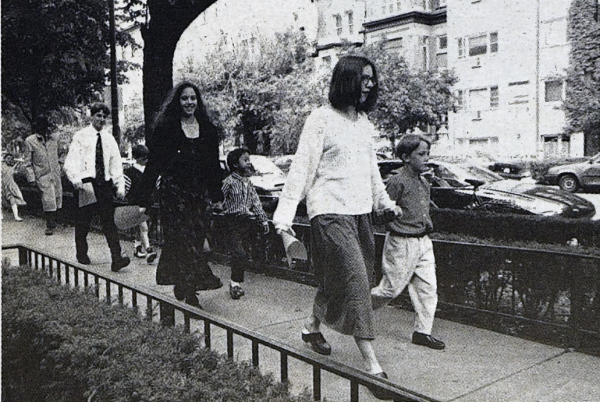Winter Sports Credit Demotion Sparks Debate
Junior McLean Moroney shooting a free throw before a game in the Field Gym.
The Upper School Athletics Department announced that the typical half-credit the winter sports season offers will now be demoted to a quarter-credit, sparking an uproar of opinions about the sports credit system entirely.
Physical Education Department Chair Tony Pascolla sent an email on January 17 notifying the Latin community of the switch, which will be effective next school year, yet the communication lacked a clear explanation as to why the change was made. Most sports in the winter season go significantly longer than fall and spring sports (some for a total of four months), so how can this credit deduction be fair to winter season athletes?
In order to graduate, Latin students must earn two PE credits. One credit is automatically granted from ninth-grade wellness. However, the other must be from sports (counted only for grades 10-12), Independent Study Projects (ISPs), club sports (squash, hockey, ultimate frisbee, figure skating), or gym classes. Playing a single sport over all four years leaves students one quarter credit short of the graduation requirement, meaning students must either play at least one season of another sport, add a PE class to their schedule, or complete a fitness ISP. The recent credit switch means this is now the case for winter sport athletes, too, even though their seasons are longer.
The new system also sparked concern among athletes who hope to receive recruitment opportunities from colleges, because they now must take on another sport to graduate, which often disrupts their out-of-school commitments. A student can always opt to take in-school PE courses, though.
Madelyn Starr, a sophomore squash player said, “It’s ridiculous. I wasted a bunch of time when I could have been doing schoolwork, and now I have to find another sport to play.”
While students’ feelings are understandable, there is more than one way to fulfill the necessary gym credit. There are a wide variety of possible PE classes offered for high school students. From yoga to fitness, there is a course suited for every student. Although it fills up one spot in the limited eight-block schedule, one could argue it’s an easier method to complete the requirement. All the work is in school, requires less commitment, and offers structured practice times that won’t conflict with other extracurriculars.
Sophomore Finn Deeney said, “I am involved with performing arts both before and after school, with shows every couple of months, so completing my credits within school hours has been great for me.”
Sanya Arora, a sophomore lacrosse goalie, said, “We are putting so much effort into these extra school sports and only get quarter credits. I know [sports are] fun and all, but [they’re] a huge time commitment.”
Mr. Pascolla said he felt the old system was not fair to other athletes. “I know the winter season is longer, and I value their commitment, but many athletes work just as hard as winter athletes depending on their season, with considerably less credit per season,” he said.
Additionally, some students simply don’t have the time or desire to play multiple sports. High school is a stressful time for everyone. Students often participate in multiple clubs, affinity groups, and jobs, which doesn’t leave much time for an extra sport.
Latin’s hockey team faces similar frustrations. In addition to their long season, hockey players have out-of-town tournaments, weekly practices, and games starting as late as 9 p.m. on both weekdays and weekends.
Sophomore hockey player Carla McSweeney said, “I should not only be getting a quarter-credit for a season going from September to March.”
Even though their sport is during the fall season, the girls swim team has historically received a half-credit. Their season is considerably longer than any other fall sport, and boys swimming, which falls in the winter, has gotten a half-credit.
Sophomore Kate Weiskirch said, “People on the winter sports team put in the same amount of effort, even more sometimes, and it’s a longer season, so I do not like [the change]. A quarter credit doesn’t seem equitable for the winter athletes.”
There are also considerably fewer sports offered in the winter season compared to the fall and spring seasons. The only sports Latin offers are girls and boys basketball and boys swimming. Typically, all club sports count as PE credits as well, but this year, squash players do not get their usual half-credit. Squash receives a quarter-credit this year, while the other winter athletics still receive the half-credit.
In order to have a club sport or ISP count for credit, athletes must play for a minimum of six hours per week, yet the sheer number of participants makes this requirement impossible for squash players—there isn’t enough space or time for everyone to practice every day. It’s no one’s fault that so many people signed up to play, but the lack of communication between administrators and coaches leaves squash players frustrated about the situation.
Sophomore Eva Ramette, a second-year squash player, will receive only a quarter-credit but feels she should get a half-credit. “Because other people joined, I am not getting the credit I signed up for,” she said. “It shouldn’t be removed just because others are playing too.”
Regarding the PE Department’s plans for the future, Mr. Pascolla believes there’s still room for the credit system to grow. “It’s not a perfect system,” he said, “so we are open to change and giving proper compensation to hard-working athletes.”

Kayley McCutcheon (‘25) has written for The Forum since spring of her freshman year and will continue to share stories with her fellow Latin peers. The...




















































